1. Overview
Newton Leroy "Newt" Gingrich (GingrichˈɡɪŋɡrɪtʃEnglish), born Newton Leroy McPherson on June 17, 1943, is an American politician and author. He served as the 50th Speaker of the United States House of Representatives from 1995 to 1999. A member of the Republican Party, he represented Georgia's 6th congressional district from 1979 until his resignation in 1999. Gingrich rose to national prominence as a key architect of the "Contract with America" and a leading figure in the "Republican Revolution" of 1994, which ended four decades of Democratic majority in the House. For his pivotal role, he was named Time magazine's "Man of the Year" in 1995.
During his speakership, Gingrich oversaw significant legislative actions such as welfare reform and a capital gains tax cut, and contributed to the first balanced federal budget since 1969. However, his tenure was also marked by intense partisan conflict, including federal government shutdowns, and an impeachment vote against President Bill Clinton. Academics widely credit Gingrich with playing a significant role in hastening political polarization in the United States and undermining democratic norms through combative rhetoric and hyper-partisanship. He faced ethics charges and received a reprimand from the House for an ethics violation. Following a disappointing performance by Republicans in the 1998 congressional elections and internal party pressure, Gingrich resigned from the House on January 3, 1999.
After leaving Congress, Gingrich remained active in public policy debates, working as a political consultant and founding several policy think tanks. He unsuccessfully ran for the Republican nomination for president in the 2012 election, winning the South Carolina primary but ultimately withdrawing. He later became a prominent ally of President Donald Trump, supporting Trump's presidential campaigns in 2016 and 2020, including his false claims of a stolen election. His career is often viewed as a case study in the challenges faced by radical, polarizing figures in leadership, illustrating the difficulty in sustaining power through confrontational tactics.
2. Early life
Newt Gingrich's formative years were shaped by his family background, his education, and his early academic career before he transitioned into politics.
2.1. Birth and family
Gingrich was born Newton Leroy McPherson on June 17, 1943, at the Harrisburg Hospital in Harrisburg, Pennsylvania. His biological mother, Kathleen "Kit" Daugherty (1925-2003), and biological father, Newton Searles McPherson (1923-1970), married in September 1942 when she was 16 and he was 19. Their marriage dissolved within days. His paternal grandparents were Robert Nelson Kerstetter (1888-1930) and Louise S. McPherson (1905-1982), and his maternal grandparents were Jacob Leroy Daugherty (1890-1939) and Ethel M. Hendricks (1896-1942). In 1946, his mother married Robert Gingrich (1925-1996), a career Army officer who served tours in Korea and Vietnam. Robert Gingrich adopted Newton, who then took the surname Gingrich.
Gingrich has three younger half-siblings from his mother's marriage to Robert Gingrich: Candace Gingrich, Susan Gingrich, and Roberta Brown. He also has a half-sister and a half-brother, Randy McPherson, from his biological father's side. He was raised in Hummelstown, Pennsylvania, and on various military bases where his adoptive father was stationed. In 1956, the family moved to Europe, living for periods in Orléans, France, and Stuttgart, Germany. The family's religion was Lutheran. In 1960, during his junior year of high school, the family relocated to Fort Moore in Georgia.
2.2. Education
In 1961, Gingrich graduated from Baker High School in Columbus, Georgia, where he met his future first wife, who was his math teacher. His interest in politics began during his teenage years; a visit to the site of the Battle of Verdun in France deeply impressed upon him the sacrifices made there and the critical importance of political leadership.
Gingrich pursued higher education at Emory University in Atlanta, where he earned a Bachelor of Arts degree in history in 1965. He then continued his graduate studies at Tulane University in New Orleans, receiving a Master of Arts in 1968 and a Doctor of Philosophy in European history in 1971. His doctoral dissertation was titled "Belgian Education Policy in the Congo 1945-1960." During 1969 and 1970, he spent six months in Brussels working on his dissertation. He received deferments from military service during the Vietnam War due to his status as a student and a father. In 1985, he reflected on this, stating, "Given everything I believe in, a large part of me thinks I should have gone over."
2.3. Teaching career
In 1970, Gingrich joined the history department at West Georgia College. While there, he coordinated a new environmental studies program and was later transferred to the geography department by 1976. During his time at the college, he took unpaid leave on three occasions to run for the U.S. House of Representatives. University system rules prohibited serving professors from running for office. He left the college in 1977 after being denied tenure.
3. Early political career
Gingrich's initial forays into the political arena were marked by several unsuccessful campaigns for Congress and his foundational efforts to organize and energize the conservative movement within the Republican Party.
Gingrich served as the southern regional director for Nelson Rockefeller in the 1968 Republican primaries.
3.1. Congressional campaigns

In 1974, Gingrich made his first bid for political office as the Republican candidate in Georgia's 6th congressional district, covering north-central Georgia. He lost to the 20-year incumbent Democrat Jack Flynt by 2,770 votes. Despite the loss, his relative success surprised political analysts, as Flynt had never faced a serious challenger and 1974 was a difficult year for Republicans nationally due to the Watergate scandal.
Gingrich sought a rematch against Flynt in 1976. Although Republicans fared slightly better in the 1976 House elections nationally, the presence of former Georgia governor Jimmy Carter as the Democratic presidential candidate significantly impacted the race. Carter won over two-thirds of the vote in his home state, and Gingrich lost his election by 5,100 votes.
As Gingrich prepared for another run in the 1978 elections, Flynt decided to retire. Gingrich successfully defeated Democratic state senator Virginia Shapard by 7,500 votes. He was re-elected five times from this district before it was modified by redistricting. His closest general election race occurred in the House elections of 1990, where he won by a narrow 974 vote margin against Democrat David Worley, after winning his primary by 978 votes against Republican Herman Clark. While the district was trending Republican nationally, conservative Democrats continued to hold most local offices and seats in the Georgia General Assembly well into the 1980s.
Due to population increases recorded in the 1990 United States census, Georgia gained an additional seat for the 1992 U.S. House elections. The Democratic-controlled Georgia General Assembly, led by Speaker Tom Murphy, specifically targeted Gingrich through gerrymandering, eliminating his district and splitting his territory among three neighboring districts. Much of the southern portion of his district, including his home in Carrollton, was drawn into the Columbus-based 3rd district, represented by five-term Democrat Richard Ray. Gingrich commented that Speaker Murphy had "sincerely dedicated a part of his career to wiping me out."
The Assembly created a new, heavily Republican 6th district in the wealthy northern suburbs of Atlanta, specifically in Fulton and Cobb counties-an area Gingrich had never represented. Gingrich sold his home in Carrollton and moved to Marietta within the new district. His primary opponent, State Representative Herman Clark, who had challenged him two years prior, raised issues about Gingrich's 22 overdraft checks in the House banking scandal and criticized his move into the district. After a recount, Gingrich prevailed by 980 votes, with a 51 to 49 percent result. His primary victory effectively ensured his election in November, and he was re-elected three times from this new district against nominal Democratic opposition.
3.2. Early party roles
In 1981, Gingrich co-founded the Military Reform Caucus (MRC) and the Congressional Aviation and Space Caucus. During the 1983 congressional page sex scandal, he was among those who called for the expulsion of representatives Dan Crane and Gerry Studds. Gingrich also supported a proposal to ban loans from the International Monetary Fund to Communist countries and endorsed a bill to establish Martin Luther King Jr. Day as a new federal holiday.
3.3. Conservative Opportunity Society

In 1983, Gingrich founded the Conservative Opportunity Society (COS), a group of young conservative House Republicans. Early members included Robert Smith Walker, Judd Gregg, Dan Coats, and Connie Mack III. The group gradually expanded to several dozen representatives, meeting weekly to exchange and develop ideas. Gingrich's analysis of polls and public opinion guided the group's initial focus.
Ronald Reagan adopted the "opportunity society" ideas for his 1984 re-election campaign, supporting the group's conservative goals on economic growth, education, crime, and social issues, which he had not emphasized during his first term. Reagan also referred to an "opportunity" society in the first State of the Union address of his second term.
4. Congressional career
Gingrich's tenure as a U.S. Representative was marked by his aggressive political tactics, his rise to the speakership, and his role in shaping the legislative agenda and increasing partisan divisions.
4.1. Entry into the House
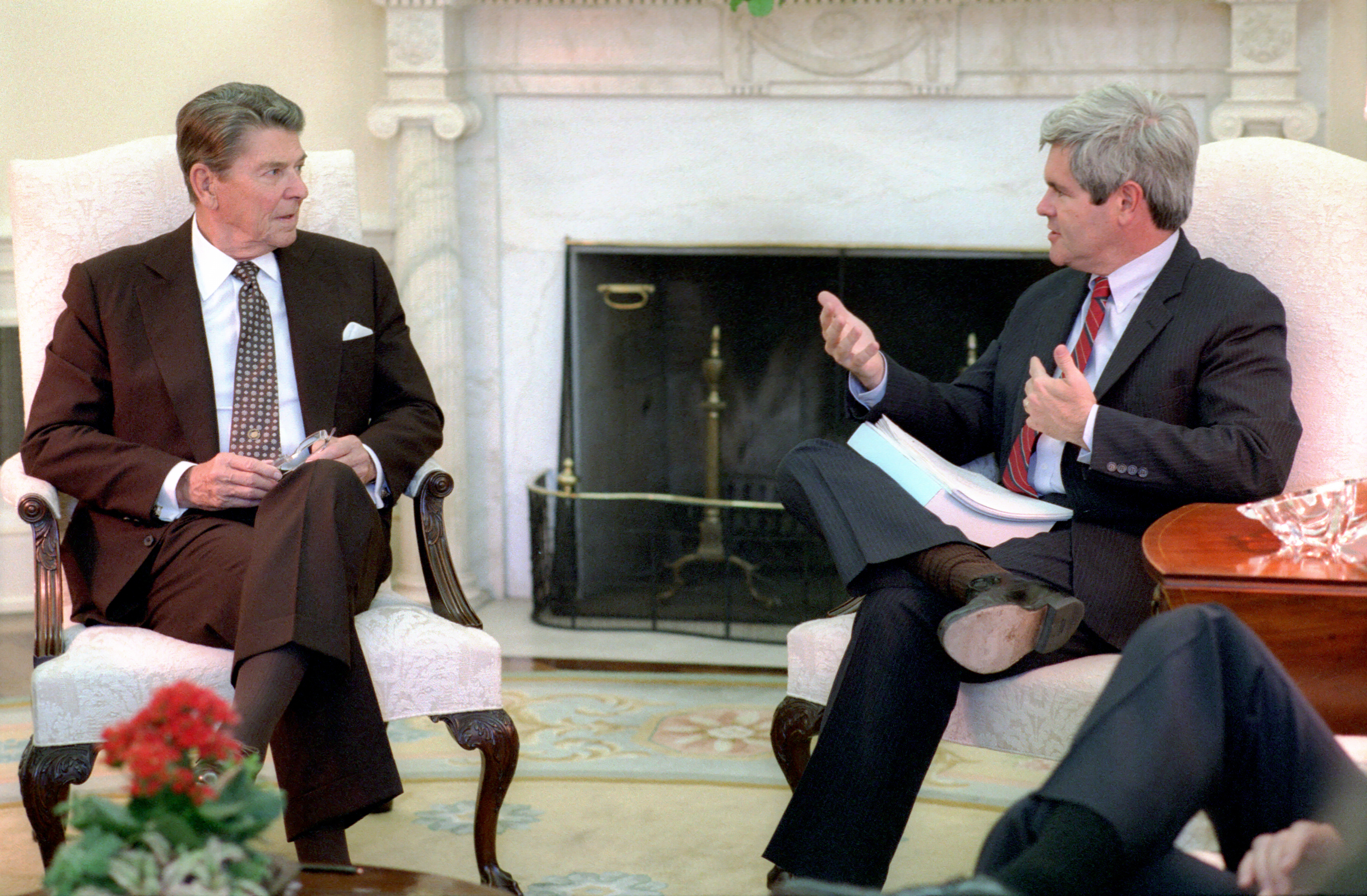
Known as a charismatic figure in Washington, Gingrich quickly impressed many with his ideas and party leadership. In March 1988, Gingrich voted against the Civil Rights Restoration Act of 1987 and to uphold President Reagan's veto of the bill. In May 1988, Gingrich, along with 77 other House members and Common Cause, brought ethics charges against Democratic Speaker Jim Wright, alleging that Wright had used a book deal to circumvent campaign-finance laws and House ethics rules. During the investigation, it was reported that Gingrich himself had an unusual book deal for his book, Window of Opportunity, where publicity expenses were covered by a limited partnership that raised 105.00 K USD from Republican political supporters to promote sales. Gingrich's success in forcing Wright's resignation significantly contributed to his rising influence within the Republican caucus.
In March 1989, Gingrich was elected House Minority Whip in a close election against Edward Rell Madigan, marking his first formal position of power within the Republican Party. He stated his intention to "build a much more aggressive, activist party." Early in his role as Whip, in May 1989, Gingrich was involved in discussions about the appointment of a Panamanian administrator for the Panama Canal, which was scheduled for 1989 subject to U.S. government approval. Gingrich was outspoken in his opposition to giving control over the canal to an administrator appointed by the dictatorship in Panama.
Gingrich and other House members, including the newly formed Gang of Seven, publicly criticized what they perceived as ethical lapses during nearly 40 years of Democratic control. The House banking scandal and Congressional Post Office scandal became symbols of the exposed corruption. Gingrich himself was among the members of the House who had written NSF checks on the House bank, with overdrafts on 22 checks, including one for 9.46 K USD to the Internal Revenue Service in 1990.
In 1990, after consulting focus groups with the help of pollster Frank Luntz, GOPAC distributed a memo with a cover letter signed by Gingrich titled "Language, a Key Mechanism of Control." This memo encouraged Republicans to "speak like Newt" and contained lists of "contrasting words"-negative terms like "radical," "sick," and "traitor"-and "optimistic positive governing words" such as "opportunity," "courage," and "principled," which Gingrich recommended for describing Democrats and Republicans, respectively.
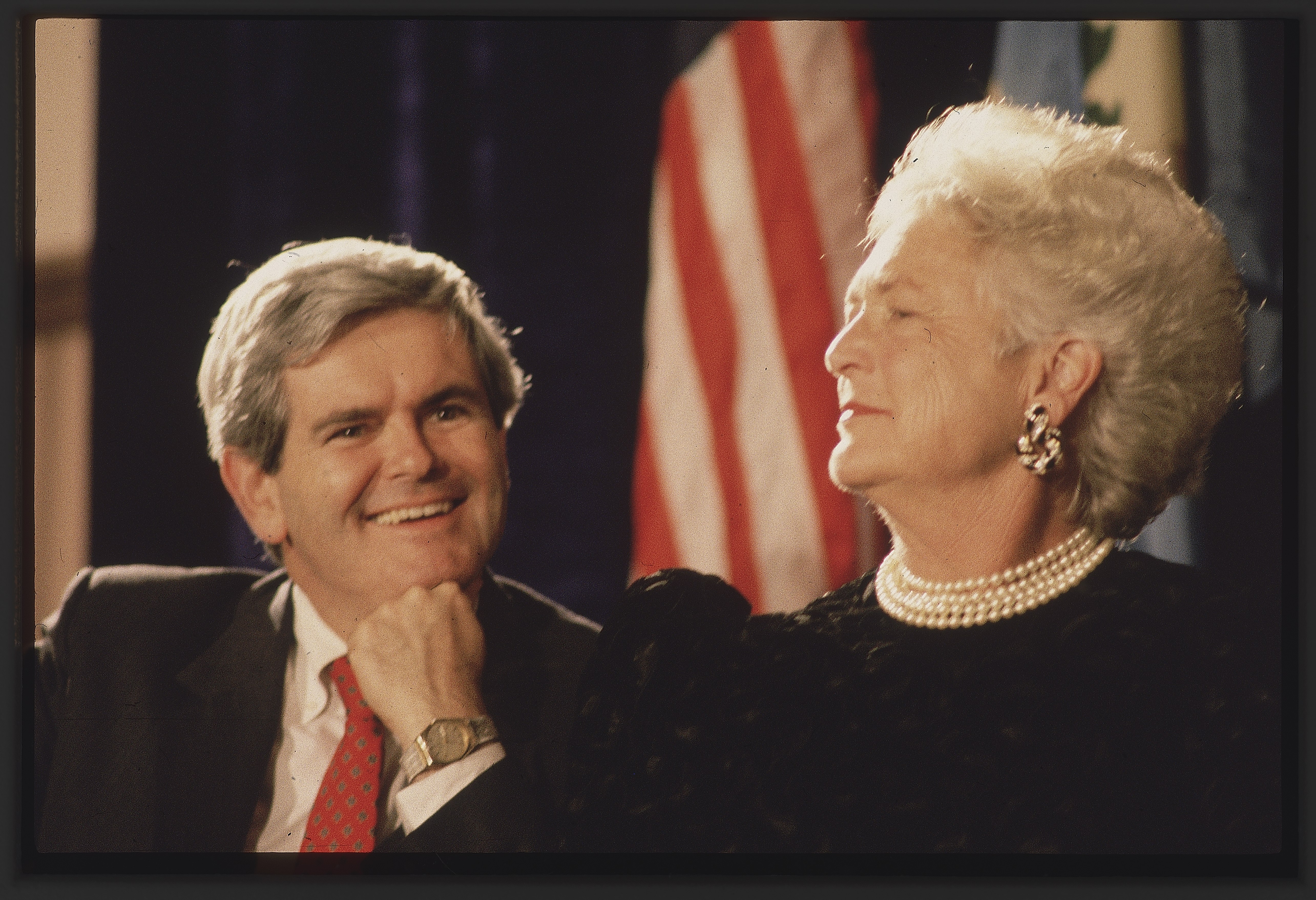
During negotiations with the Democratic majorities in the House and Senate, President George H. W. Bush reached a deficit reduction package that included tax increases, despite his campaign promise of "read my lips: no new taxes". Gingrich led a revolt that defeated the initial appropriations package and contributed to the 1990 United States federal government shutdown. The deal had been supported by the President and Congressional leaders from both parties after long negotiations, but Gingrich famously walked out during a televised event in the White House Rose Garden. House Minority Leader Robert H. Michel characterized Gingrich's revolt as "a thousand points of spite".
4.2. "Contract with America" and the "Republican Revolution"
In the 1994 campaign season, Gingrich and several other Republicans developed the "Contract with America" as an alternative to Democratic policies and a means to unite disparate wings of the Republican Party. This document laid out 10 policies that Republicans promised to bring to a vote on the House floor during the first 100 days of the new Congress, should they win the election. The contract was signed by Gingrich and other Republican candidates for the House of Representatives. Its provisions ranged from issues such as welfare reform, term limits, crime, and a balanced budget/tax limitation amendment, to more specific legislation like restrictions on American military participation in United Nations missions.
In the November 1994 midterm elections, Republicans achieved a historic victory, gaining 54 seats and taking control of the House for the first time since 1954. With long-time House Minority Leader Bob Michel not seeking re-election, Gingrich, as the highest-ranking Republican returning to Congress, was poised to become Speaker. This midterm election, which shifted congressional power to Republicans, fundamentally "changed the center of gravity" in Washington, D.C. Time magazine recognized Gingrich's pivotal role by naming him its 1995 "Man of the Year" for his part in ending the four-decades-long Democratic majority in the House.
4.3. Key legislative initiatives
As House Speaker, Gingrich prioritized and oversaw the passage of several major legislative initiatives, reflecting the core tenets of the "Contract with America."
4.3.1. Welfare reform
A central promise of President Bill Clinton's campaign was to reform the welfare system, including the implementation of work requirements for recipients. However, by 1994, the Clinton administration appeared to be more focused on a universal health care program. Gingrich accused Clinton of delaying welfare reform and asserted that Congress could pass a welfare reform bill in as little as 90 days, vowing that the Republican Party would maintain political pressure on the President to approve their legislation.
In 1996, after President Clinton vetoed two welfare reform bills, Gingrich and his supporters successfully pushed for the passage of the Personal Responsibility and Work Opportunity Act. This act aimed to reconstruct the welfare system by granting state governments greater autonomy over welfare delivery while reducing the federal government's responsibilities. It established the Temporary Assistance for Needy Families program, which imposed time limits on welfare assistance and replaced the long-standing Aid to Families with Dependent Children program. Other significant changes included stricter eligibility requirements for food stamps, reductions in welfare assistance for immigrants, and mandatory work requirements for recipients. President Clinton signed the bill into law on August 22, 1996.
In his 1998 book Lessons Learned the Hard Way, Gingrich advocated for volunteerism and spiritual renewal, emphasizing the importance of families, creating tax incentives, and reducing regulations for businesses in disadvantaged neighborhoods. He also promoted increased property ownership among low-income families and praised Habitat for Humanity for its role in helping people build their own homes.
4.3.2. Balancing the federal budget
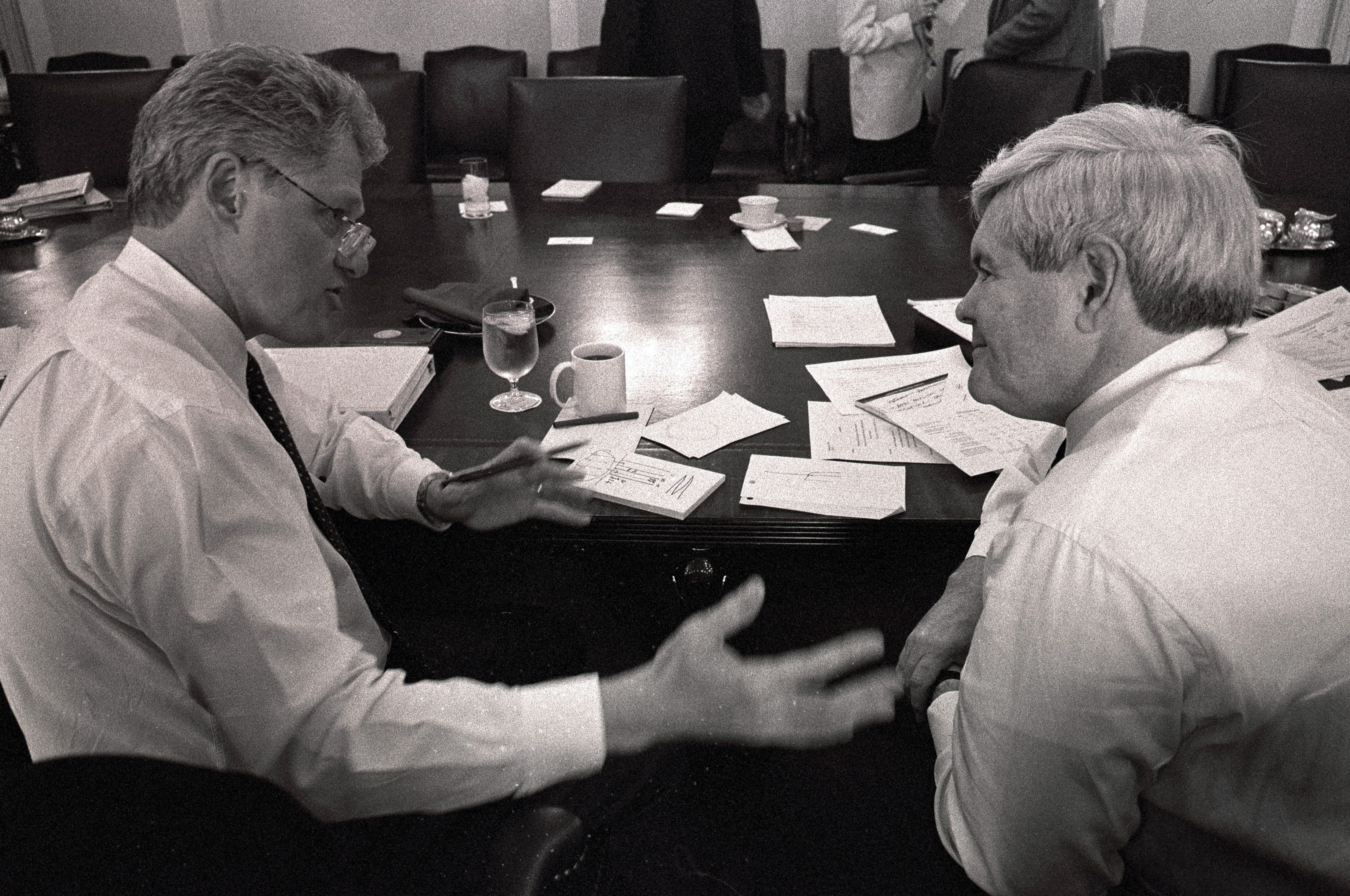
A key component of the 1994 Contract with America was the promise of a balanced federal budget. After the conclusion of the government shutdown, Gingrich and other Republican leaders conceded that Congress would not be able to draft a balanced budget in 1996. Instead, they opted to approve minor reductions already agreed upon by the White House and defer further action until the next election cycle.
By May 1997, Republican congressional leaders reached a compromise with Democrats and President Clinton on the federal budget. The agreement outlined a federal spending plan designed to reduce the federal deficit and achieve a balanced budget by 2002. This plan included a total of 152.00 B USD in bipartisan tax cuts over five years. Other significant elements of the spending plan allocated 115.00 B USD in savings through a restructuring of Medicare, set aside 24.00 B USD to extend health insurance to children of the working poor, provided tax credits for college tuition, and initiated a 2.00 B USD welfare-to-work jobs program. President Clinton signed the budget legislation in August 1997. At the signing, Gingrich credited ordinary Americans, stating, "It was their political will that brought the two parties together."
In early 1998, with the economy performing better than anticipated, increased tax revenues helped reduce the federal budget deficit to below 25.00 B USD. President Clinton subsequently submitted a balanced budget for 1999, three years ahead of the original schedule, marking the first time the federal budget had been balanced since 1969.
4.3.3. Taxpayer Relief Act of 1997
In 1997, President Clinton signed into law the Taxpayer Relief Act of 1997, which included the largest capital gains tax cut in U.S. history. Under this act, profits from the sale of a personal residence (up to 500.00 K USD for married couples and 250.00 K USD for singles) were exempted from taxation if the residence had been lived in for at least two of the previous five years. This significantly expanded upon the previous limitation of a 125.00 K USD once-in-a-lifetime exemption for those over 55. The act also included reductions in a number of other taxes on investment gains.
Additionally, the act increased the value of inherited estates and gifts that could be sheltered from taxation. Gingrich is credited with setting the agenda for the reduction in capital gains tax, particularly through the "Contract with America," which aimed to balance the budget and implement decreases in estate and capital gains tax. While some Republicans felt that the compromise reached with Clinton on the budget and tax act was insufficient, Gingrich asserted that the tax cuts represented a significant accomplishment for the Republican Congress despite opposition from the Clinton administration. Earlier, Gingrich, along with Bob Dole, had established the Kemp Commission, chaired by former US Secretary of Housing and Urban Development Jack Kemp, a tax reform commission that recommended, among other things, that dividends, interest, and capital gains should be untaxed.
4.3.4. Other legislation
Among the first pieces of legislation passed by the new Congress under Gingrich's leadership was the Congressional Accountability Act of 1995. This act subjected members of Congress to the same laws that apply to businesses and their employees, including the Civil Rights Act of 1964 and the Americans with Disabilities Act of 1990. As a provision of the "Contract with America," the law symbolized the new Republican majority's goal to eliminate some of the entitlements enjoyed by Congress. The bill received near-universal acceptance from both the House and Senate and was signed into law on January 23, 1995.
Gingrich also controversially shut down the highly regarded Office of Technology Assessment, opting instead to rely on what the Bulletin of the Atomic Scientists described as "self-interested lobbyists and think tanks."
4.4. Government shutdowns
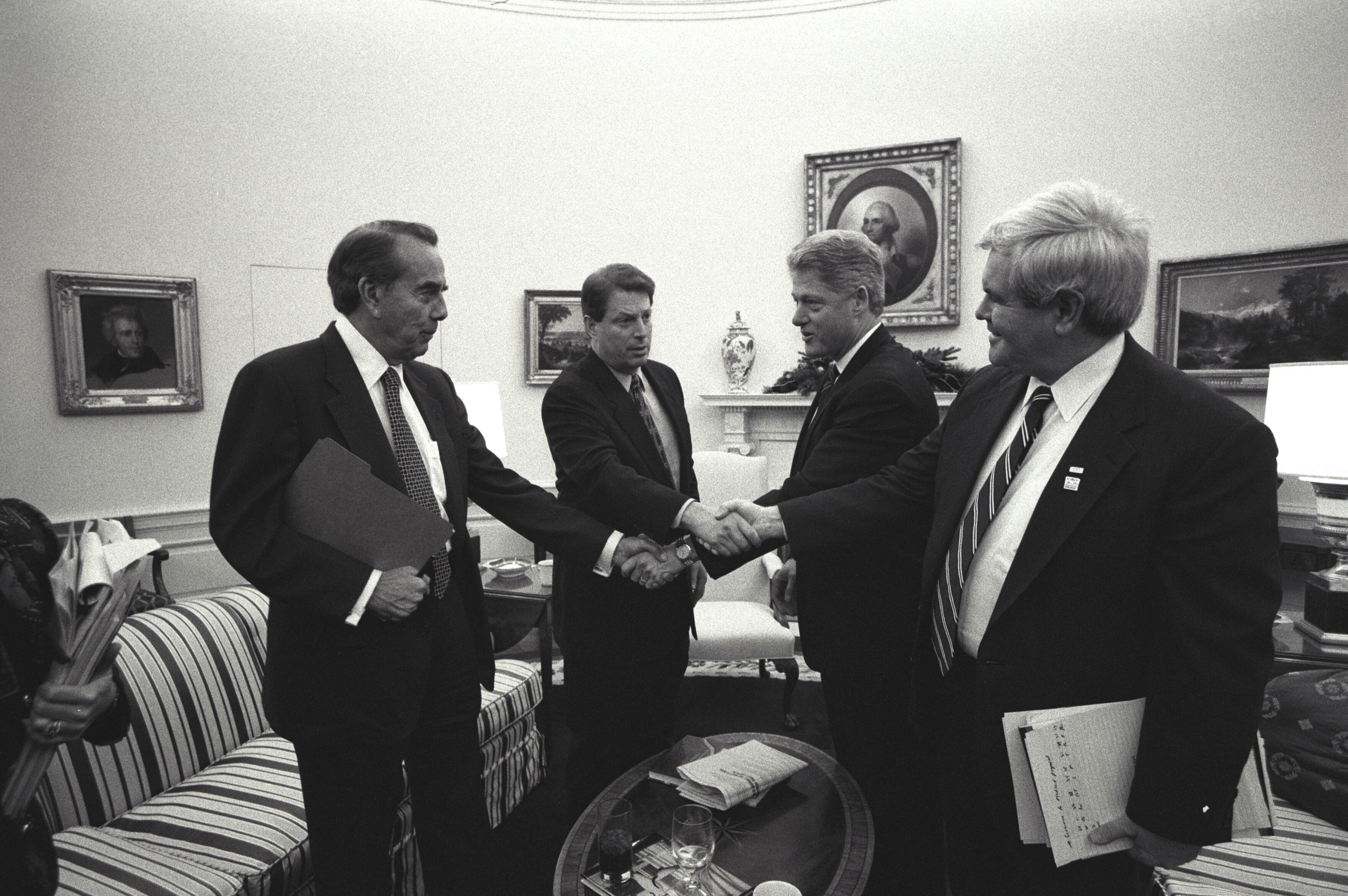
Gingrich and the incoming Republican majority's promise to significantly slow the rate of government spending directly conflicted with President Clinton's agenda for Medicare, education, the environment, and public health. This clash led to two temporary shutdowns of the federal government, totaling 28 days.
Clinton argued that Republican amendments would strip the U.S. Treasury of its ability to utilize federal trust funds to avoid a borrowing crisis. Republican amendments sought to limit appeals by death-row inmates, make it more difficult to issue health, safety, and environmental regulations, and commit the president to a seven-year balanced budget. Clinton vetoed a second bill that would have allowed the government to continue operating beyond the expiration of most spending authority. A Republican amendment particularly opposed by Clinton would have not only increased Medicare Part B premiums but also canceled a scheduled reduction. Republicans insisted on an increase in Medicare Part B premiums to 53.5 USD a month in January 1996, while Clinton favored allowing the premium for seniors to drop to 42.5 USD.
The government closed most non-essential offices during the shutdown, which was the longest in U.S. history at the time. The shutdown eventually ended when Clinton agreed to submit a CBO-approved balanced budget plan.
During the crisis, Gingrich's public image suffered significantly from the perception that the Republicans' hardline budget stance was partly due to an alleged snub by Clinton. This perception arose after Gingrich, speaking at a Christian Science Monitor breakfast, implied he was dissatisfied that Clinton had not invited him to discuss the budget during a flight on Air Force One to and from Yitzhak Rabin's funeral in Israel. He complained that he and Dole were instructed to use the plane's rear exit to deplane, suggesting the snub was "part of why you ended up with us sending down a tougher continuing resolution." However, NBC News released videotape footage showing both Gingrich and Dole disembarking just behind Clinton via the front stairway in Tel Aviv.
Gingrich was widely lampooned for implying that the government shutdown was a result of his personal grievances, including a widely shared editorial cartoon depicting him as a baby throwing a tantrum. Democratic leaders, including Chuck Schumer, seized the opportunity to attack Gingrich's motives for the budget standoff. In 1998, Gingrich admitted that these comments were his "single most avoidable mistake" as Speaker.
Despite the negative public perception, Gingrich later defended his actions, stating that "Everybody in Washington thinks that was a big mistake. They're exactly wrong. There had been no reelected Republican majority since 1928. Part of the reason we got reelected... is our base thought we were serious. And they thought we were serious because when it came to a show-down, we didn't flinch." In a 2011 op-ed in The Washington Post, Gingrich argued that the government shutdown ultimately led to the balanced-budget deal in 1997 and the first four consecutive balanced budgets since the 1920s, as well as the first re-election of a Republican majority since 1928.
4.5. Role in political polarization
A number of scholars have widely credited Newt Gingrich with playing a key role in undermining democratic norms in the United States and significantly hastening political polarization and partisan prejudice. According to Harvard University political scientists Daniel Ziblatt and Steven Levitsky, Gingrich's speakership had a profound and lasting impact on American politics and the health of American democracy. They argue that Gingrich instilled a "combative" approach in the Republican Party, where hateful language and hyper-partisanship became commonplace, and where democratic norms were abandoned. Gingrich frequently questioned the patriotism of Democrats, labeled them as corrupt, compared them to fascists, and accused them of seeking to destroy the United States. His tenure also notably included several major government shutdowns.
University of Maryland political scientist Lilliana Mason identified Gingrich's instructions to Republicans to use words such as "betray, bizarre, decay, destroy, devour, greed, lie, pathetic, radical, selfish, shame, sick, steal, and traitor" when describing Democrats as a clear example of a breach in social norms and an exacerbation of partisan prejudice. Gingrich is a central figure in the 2017 book The Polarizers by Colgate University political scientist Sam Rosenfeld, which examines the American political system's shift toward polarization and gridlock. Rosenfeld describes Gingrich's philosophy: "For Gingrich, responsible party principles were paramount... From the outset, he viewed the congressional minority party's role in terms akin to those found in parliamentary systems, prioritizing drawing stark programmatic contrasts over engaging the majority party as junior participants in governance."
Boston College political scientist David Hopkins writes that Gingrich helped to nationalize American politics, increasingly tying Democratic politicians at the state and local levels to the national Democratic Party and President Clinton. Hopkins notes that Gingrich's view "directly contradicted the conventional wisdom of politics... that parties in a two-party system achieve increasing electoral success as they move closer to the ideological center... Gingrich and his allies believed that an organized effort to intensify the ideological contrast between the congressional parties would allow the Republicans to make electoral inroads in the South. They worked energetically to tie individual Democratic incumbents to the party's more liberal national leadership while simultaneously raising highly charged cultural issues in Congress, such as proposed constitutional amendments to allow prayer in public schools and to ban the burning of the American flag, on which conservative positions were widely popular - especially among southern voters." Gingrich's approach was ultimately vindicated by the Republican Party's significant success in the 1994 U.S. midterm elections, an event sometimes referred to as the "Gingrich Revolution." Hopkins further states, "More than any speaker before or since, Gingrich had become both the strategic architect and public face of his party." A consequence of this increasing nationalization of politics was that moderate Republican incumbents in traditionally Democratic states became more vulnerable to electoral defeat.
According to University of Texas political scientist Sean M. Theriault, Gingrich had a profound influence on other Republican lawmakers, particularly those who served with him in the House, as they adopted his obstructionist tactics. A 2011 study by Theriault and Duke University political scientist David W. Rohde in the Journal of Politics found that "almost the entire growth in Senate party polarization since the early 1970s can be accounted for by Republican senators who previously served in the House after 1978," the year Gingrich was first elected to the House.
Gingrich also consolidated power within the Speaker's office. He elevated junior and more ideologically extreme House members to powerful committees, such as the Appropriations Committee, which over time led to the erosion of internal norms within these committees. Term limits were also imposed on committee chairs, a measure that prevented Republican chairs from developing a power base separate from the Republican Party. As a result, Gingrich's power was strengthened, and there was an increase in conformity among Republican congresspeople.
4.6. Ethics charges and reprimand

During his term as Speaker, 84 ethics charges were filed by Democrats against Gingrich. All charges were eventually dropped except for one: the claim of tax-exempt status for a college course that was deemed to have been run for political purposes. On January 21, 1997, the House of Representatives officially reprimanded Gingrich by a vote of 395 in favor and 28 opposed. He was also "ordered [him] to reimburse the House for some of the costs of the investigation in the amount of 300.00 K USD." This marked the first time a Speaker of the House had been disciplined for an ethics violation.
Additionally, the House Ethics Committee concluded that inaccurate information provided to investigators on behalf of Gingrich represented "intentional or... reckless" disregard of House rules. The Ethics Committee's Special Counsel, James M. Cole, concluded that Gingrich had violated federal tax law and had lied to the ethics panel in an attempt to force the committee to dismiss the complaint against him. However, the full committee panel did not agree on whether tax law had been violated and deferred that issue to the IRS. In 1999, the IRS cleared the organizations connected with the "Renewing American Civilization" courses that had been under investigation for possible tax violations.
Regarding the situation, Gingrich stated in January 1997, "I did not manage the effort intensely enough to thoroughly direct or review information being submitted to the committee on my behalf. In my name and over my signature, inaccurate, incomplete and unreliable statements were given to the committee, but I did not intend to mislead the committee... I brought down on the people's house a controversy which could weaken the faith people have in their government."
4.7. Leadership challenge

In the summer of 1997, several House Republicans attempted to replace Gingrich as Speaker, arguing that his public image had become a liability for the party. This attempted "coup" began on July 9 with a meeting between Republican conference chairman John Boehner of Ohio and Republican leadership chairman Bill Paxon of New York. Their plan was to present Gingrich with an ultimatum: either resign or face a vote to be removed.
However, House Majority Leader Dick Armey hesitated at the proposal to make Paxon the new Speaker and instructed his chief of staff to warn Gingrich. On July 11, Gingrich met with senior Republican leadership to assess the situation. He unequivocally stated that he would not step down under any circumstances. He warned that if he were voted out, a new election for Speaker would be held, which could potentially allow Democrats, in alliance with dissenting Republicans, to elect Democrat Dick Gephardt as Speaker. On July 16, Paxon offered to resign his post, feeling he had mishandled the situation, especially as the only member of the leadership who had been appointed to his position by Gingrich, rather than elected. Gingrich accepted Paxon's resignation and directed him to immediately vacate his leadership office space.
4.8. Resignation
In 1998, Gingrich's internal polls had led his fellow Republicans to believe that aggressively pursuing the Clinton-Lewinsky scandal would damage President Clinton's popularity and result in the party gaining a net total of six to thirty seats in the House of Representatives. Simultaneously, Gingrich himself was engaged in an affair with Callista Bisek, a woman 23 years his junior. However, instead of gaining seats, Republicans unexpectedly lost five, marking the worst midterm performance in 64 years for a party not holding the presidency. Other ethics violations, including an unpopular book deal, further contributed to his declining popularity, even though he was re-elected in his own district.
The day after the election, a Republican caucus, ready to rebel against him, prompted his resignation from the speakership. He also announced his intention to fully depart from the House a few weeks later, officially resigning his seat in January 1999. When relinquishing the speakership, Gingrich famously referred to other Republicans, stating he was "not willing to preside over people who are cannibals." Writing a retrospective on his career at that point, The New York Times in November 1998 described Gingrich as "an expert in how to seize power, but a novice in holding it," further opining that he "illustrate[d] how hard it is for a radical, polarizing figure to last in leadership."
In December 1997, Gingrich had considered a potential run for president in the 2000 election, but his party's midterm performance and his subsequent resignation led him to abandon any such plans.
5. Post-speakership
After leaving the U.S. House of Representatives, Newt Gingrich remained a prominent figure in American politics and public discourse, engaging in various policy, business, media, and advisory roles.
McKay Coppins of The Atlantic summarized Gingrich's life in 2018, noting his continued engagement: "[Gingrich] is dabbling in geopolitics, dining in fine Italian restaurants. When he feels like traveling, he crisscrosses the Atlantic in business class, opining on the issues of the day from bicontinental TV studios and giving speeches for 600 USD a minute. There is time for reading, and writing, and midday zoo trips-and even he will admit, 'It's a very fun life.'"
5.1. Policy and think tanks
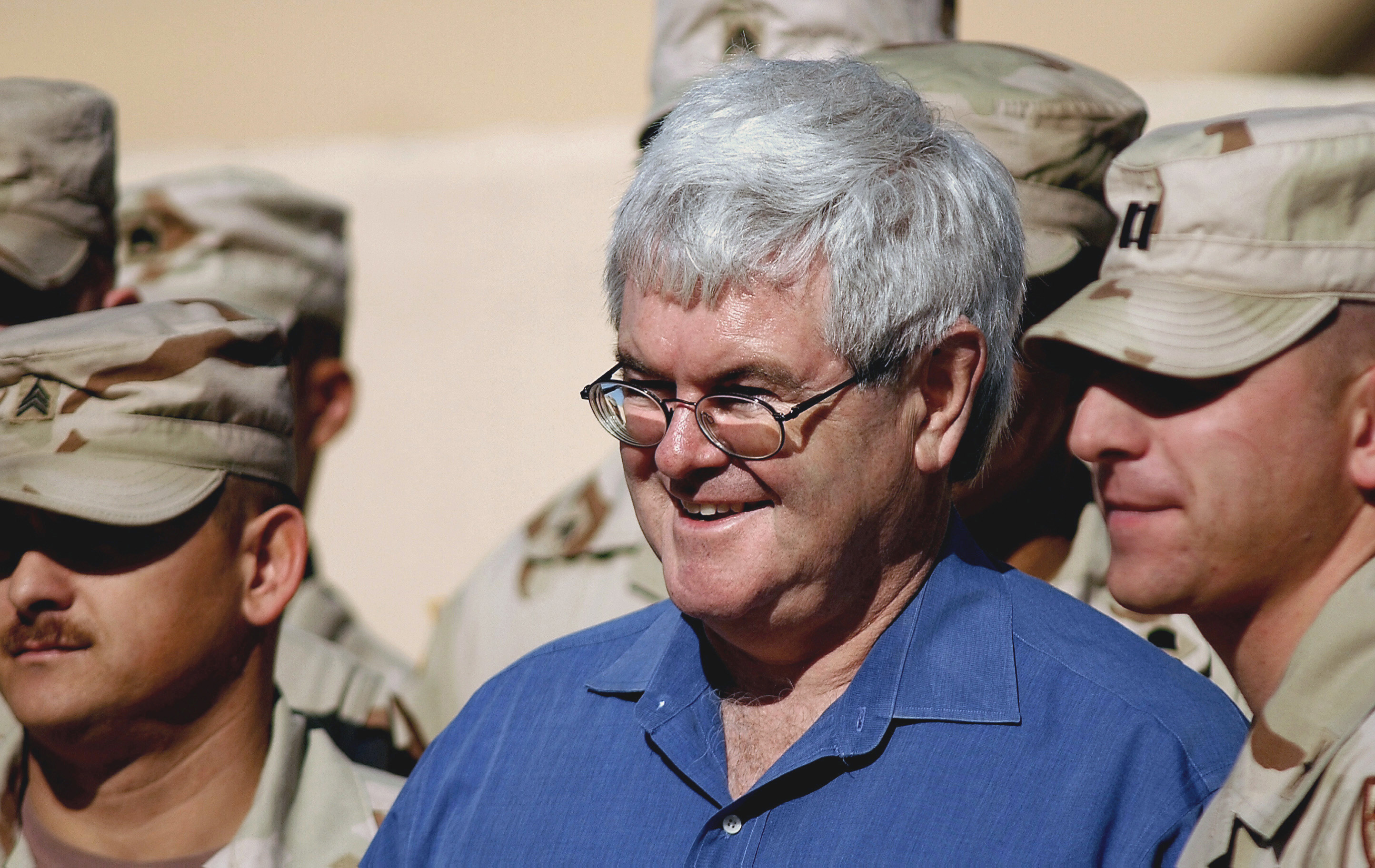
In 2003, Gingrich founded the Center for Health Transformation. He supported the Medicare Prescription Drug, Improvement, and Modernization Act of 2003, which established the Medicare Part D federal prescription drug benefit program. Some conservatives criticized him for favoring the plan due to its cost. In a May 15, 2011, interview on Meet the Press, Gingrich reiterated his long-held belief that "all of us have a responsibility to pay-help pay for health care," suggesting this could be implemented either through a mandate to obtain health insurance or a requirement to post a bond ensuring coverage. In the same interview, Gingrich stated, "I don't think right-wing social engineering is any more desirable than left-wing social engineering. I don't think imposing radical change from the right or the left is a very good way for a free society to operate." This comment generated backlash within the Republican Party.
In 2005, alongside Hillary Clinton, Gingrich announced the proposed 21st Century Health Information Act, a bill aimed at replacing paperwork with confidential, electronic health information networks. Gingrich also co-chaired an independent congressional study group formed in 2007, composed of health policy experts, to evaluate the strengths and weaknesses of actions taken within the U.S. to combat Alzheimer's disease.
Gingrich has served on several commissions, including the Hart-Rudman Commission, formally known as the U.S. Commission on National Security/21st century, which examined national security issues affecting the armed forces, law enforcement, and intelligence agencies. In 2005, he became the co-chair of a task force for United Nations reform, aiming to produce a plan for the U.S. to help strengthen the UN. For over two decades, Gingrich has taught at the United States Air Force's Air University, where, as of 2010, he was the longest-serving teacher of the Joint Flag Officer Warfighting Course. Additionally, he is an honorary distinguished visiting scholar and professor at the National Defense University and, as of 2012, was teaching officers from all defense services. Gingrich informally advised Defense Secretary Donald Rumsfeld on strategic issues, including the Israeli-Palestinian conflict and encouraging the Pentagon not to "yield" foreign policy influence to the State Department and National Security Council. Gingrich is also a guiding coalition member of the Project on National Security Reform.
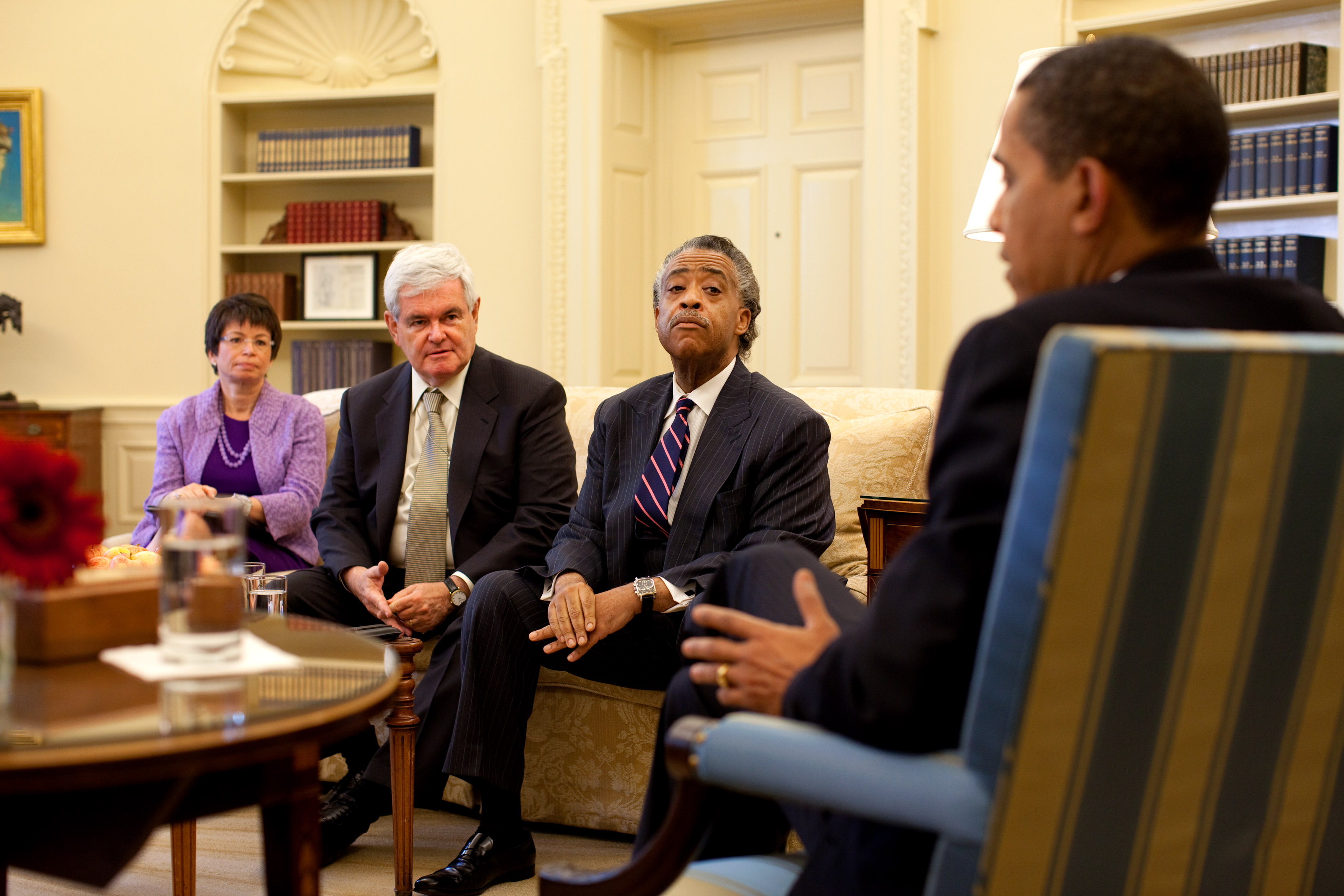
Gingrich founded and served as the chairman of American Solutions for Winning the Future, a 527 group established in 2007. This group was a "fundraising juggernaut" that raised 52.00 M USD from major donors, including Sheldon Adelson and the coal company Peabody Energy. The group promoted deregulation and increased offshore oil drilling and other fossil-fuel extraction, and opposed the Employee Free Choice Act. Politico reported that "The operation, which includes a pollster and fundraisers, promotes Gingrich's books, sends out direct mail, airs ads touting his causes and funds his travel across the country." American Solutions closed in 2011 after he left the organization.
Other organizations and companies founded or chaired by Gingrich include the creative production company Gingrich Productions and the religious educational organization Renewing American Leadership. Gingrich is a former member of the Council on Foreign Relations. He is also a fellow at conservative think tanks the American Enterprise Institute and Hoover Institution. He sometimes serves as a commentator, guest, or panel member on cable news shows, such as the Fox News Channel. He is listed as a contributor by Fox News Channel and frequently appears as a guest on various segments; he has also hosted occasional specials for the Fox News Channel. Gingrich has signed the "Strong America Now" pledge, committing to promoting Six Sigma methods to reduce government spending. He co-founded Advocates for Opioid Recovery with former Rep. Patrick J. Kennedy and Van Jones, a former domestic policy adviser to President Barack Obama.
5.2. Businesses
After leaving Congress in 1999, Gingrich established a number of for-profit companies. Between 2001 and 2010, the companies he and his wife owned, in full or in part, generated revenues of almost 100.00 M USD. As of 2015, Gingrich served as an advisor to the Canadian mining company Barrick Gold. According to financial disclosure forms released in July 2011, Gingrich and his wife had a net worth of at least 6.70 M USD in 2010, a significant increase from a maximum net worth of 2.40 M USD in 2006. Most of this increase was attributed to payments he received from his for-profit companies.
5.2.1. Gingrich Group and the Center for Health Transformation
The Gingrich Group was organized in 1999 as a consulting company. Over time, its non-health clients were phased out, and it was subsequently renamed the Center for Health Transformation. These two companies generated revenues of 55.00 M USD between 2001 and 2010. The revenues came from over 300 health-insurance companies and other clients, with membership fees costing as much as 200.00 K USD per year in exchange for access to Gingrich and other benefits. In 2011, when Gingrich became a presidential candidate, he sold his interest in the business and stated he would release the full list of his clients and the amounts he was paid, "to the extent we can."
In April 2012, the Center for Health Transformation filed for Chapter 7 bankruptcy, with plans to liquidate its assets to meet debts ranging from 1.00 M USD to 10.00 M USD. Between 2001 and 2010, Gingrich also consulted for Freddie Mac, a government-sponsored secondary home mortgage company, which was concerned about new regulations under consideration by Congress. Regarding payments of 1.60 M USD for this consulting, Gingrich stated that "Freddie Mac paid Gingrich Group, which has a number of employees and a number of offices, a consulting fee, just like you would pay any other consulting firm." In January 2012, he indicated that he could not publicly release his contract with Freddie Mac, even with the company's permission, until his business partners in the Center for Health Transformation also agreed.
5.2.2. Gingrich Productions
Gingrich Productions, led by Gingrich's wife Callista Gingrich, was established in 2007. According to the company's website in May 2011, it is "a performance and production company featuring the work of Newt and Callista Gingrich. Newt and Callista host and produce historical and public policy documentaries, write books, record audio books and voiceovers, produce photographic essays, and make television and radio appearances."
Between 2008 and 2011, the company produced three films on religion, one on energy, one on Ronald Reagan, and one on the threat of radical Islam. All were joint projects with the conservative group Citizens United. In 2011, Newt and Callista appeared in A City Upon a Hill, a film focusing on the concept of American exceptionalism. As of May 2011, the company had approximately five employees. In 2010, it paid Gingrich more than 2.40 M USD.
5.2.3. Gingrich Communications
Gingrich Communications managed Gingrich's public appearances, including his Fox News contract and his website, newt.org. By 2011, Gingrich received as much as 60.00 K USD for a single speech, giving up to 80 speeches in a year. One of Gingrich's nonprofit groups, Renewing American Leadership, founded in March 2009, paid Gingrich Communications 220.00 K USD over two years. This charity shared the names of its donors with Gingrich, who could then use them for his for-profit companies. Gingrich Communications, which at its largest employed 15 people, closed in 2011 when Gingrich began his presidential campaign.
5.2.4. Other
- Celebrity Leaders** is a booking agency that handled Gingrich's speaking engagements, as well as those of other clients such as former Republican National Committee chair Michael Steele and former Pennsylvania Senator Rick Santorum. Kathy Lubbers, the President and CEO of the agency, and Gingrich's daughter, owns the agency. Gingrich holds shares in the agency and was paid more than 70.00 K USD by it in 2010.
- FGH Publications** manages the production and royalties from fiction books co-authored by Gingrich.
5.3. Media activities
Gingrich has maintained a significant presence in media. He is a listed contributor to Fox News Channel, where he frequently appears as a guest on various segments and has hosted occasional specials. In June 2013, CNN announced that Gingrich would join a new version of Crossfire, which relaunched in the fall of 2013, with panelists S. E. Cupp, Stephanie Cutter, and Van Jones. Gingrich represented the right on this revamped debate program, which was cancelled the following year.
5.4. Advisory roles
Gingrich's advisory roles are detailed within the "Policy and think tanks" section above, covering his involvement in various commissions, teaching positions, and informal consultations on national security and policy matters.
6. Presidential campaigns and political activities
Newt Gingrich has engaged in various political activities since his speakership, including two attempts at the U.S. presidency and significant support for Donald Trump.
Between 2005 and 2007, Gingrich expressed interest in running for the 2008 Republican presidential nomination. On October 13, 2005, he suggested he was considering a run, stating, "There are circumstances where I will run," elaborating that these would be if no other candidate championed some of the platform ideas he advocated. On September 28, 2007, Gingrich announced that he would seek the nomination if his supporters pledged 30.00 M USD to his campaign by October 21. However, on September 29, spokesman Rick Tyler stated that Gingrich would not seek the presidency in 2008, citing that he could not continue to serve as chairman of American Solutions if he declared his candidacy due to campaign finance law restrictions. Gingrich confirmed, "I wasn't prepared to abandon American Solutions, even to explore whether a campaign was realistic."
During the 2009 special election in New York's 23rd congressional district, Gingrich endorsed moderate Republican candidate Dede Scozzafava, rather than Conservative Party candidate Doug Hoffman, who had been endorsed by several nationally prominent Republicans. This endorsement drew heavy criticism, with conservatives questioning his potential 2012 presidential candidacy and some even comparing him to Benedict Arnold.
Prior to President Donald Trump leaving office in January 2021, Trump appointed Gingrich to the Defense Policy Board Advisory Committee of the Pentagon as part of a series of shakeups where prominent Trump loyalists replaced former members. In February 2021, Biden-appointed Defense Secretary Lloyd Austin dismissed all appointments to the committee made by Trump, including Gingrich.
6.1. 2012 presidential run

In late 2008, several political commentators, including Marc Ambinder in The Atlantic and Robert Novak in The Washington Post, identified Gingrich as a top presidential contender for the 2012 election, with Ambinder reporting that Gingrich was "already planting some seeds in Iowa, New Hampshire." A July 2010 poll conducted by Public Policy Polling indicated that Gingrich was the leading GOP contender for the Republican nomination with 23% of likely Republican voters saying they would vote for him.
Describing his views as a possible candidate during an appearance on On the Record with Greta Van Susteren in March 2009, Gingrich stated, "I am very sad that a number of Republicans do not understand that this country is sick of earmarks. [Americans] are sick of politicians taking care of themselves. They are sick of their money being spent in a way that is absolutely indefensible... I think you're going to see a steady increase in the number of incumbents who have opponents because the American taxpayers are increasingly fed up."
On March 3, 2011, Gingrich officially launched a website titled "Newt Exploratory 2012" in lieu of a formal exploratory committee to explore a potential presidential run. On May 11, 2011, Gingrich officially announced his intention to seek the GOP nomination in 2012.
On June 9, 2011, a group of Gingrich's senior campaign aides left the campaign en masse, raising significant doubts about the viability of his presidential run. On June 21, 2011, two more senior aides departed. In response, Gingrich stated that he had not quit the race for the Republican nomination, emphasizing his experience running for 5 years to win his seat in Congress, spending 16 years helping to build a Republican majority in the House, and working for decades to build a Republican majority in Georgia. Some commentators noted Gingrich's resilience throughout his career, particularly in relation to his presidential campaign.

After then-front-runner Herman Cain was damaged by allegations of past sexual harassment, Gingrich gained support and quickly became a contender in the race, especially after Cain suspended his campaign. By December 4, 2011, Gingrich was leading in national polls. However, after an abundance of negative ads run by his opponents throughout December, Gingrich's national polling lead had fallen to a tie with Mitt Romney.
On January 3, 2012, Gingrich finished in fourth place in the Iowa Republican caucuses, trailing significantly behind Rick Santorum, Romney, and Ron Paul. On January 10, Gingrich finished in fifth place in the New Hampshire Republican primary, behind Romney, Santorum, Jon Huntsman, and Paul.
After the field narrowed with the withdrawal of Huntsman and Rick Perry, Gingrich unexpectedly won the South Carolina Republican primary on January 21, securing approximately 40% of the vote, considerably ahead of Romney, Santorum, and Paul. This surprise victory allowed Gingrich to re-emerge as a frontrunner heading into Florida.
On January 31, 2012, Gingrich placed second in the Republican Florida primary, losing by a fifteen percentage point margin (47% to 32%). Factors contributing to this outcome included two strong debate performances by Romney (which were typically Gingrich's strong suit), the significant margin by which the Gingrich campaign was outspent in television ads, and a widely criticized proposal by Gingrich to establish a permanent colony on the moon by 2020 to reinvigorate the American Space Program. It was later revealed that Romney had hired a debate coach to help him perform better in the Florida debates. Gingrich, however, significantly outvoted Santorum and Paul. On February 4, 2012, Gingrich placed a distant second in the Nevada Republican caucuses with 21%, losing to Romney, who received over 50% of the total votes cast. On February 7, 2012, Gingrich finished last in the Minnesota Republican caucuses with about 10.7% of the vote. Santorum won the caucus, followed by Paul and Romney.
On Super Tuesday, Gingrich won his home state, Georgia, which had the most delegates, in "an otherwise dismal night for him." Santorum took Tennessee and Oklahoma, states where Gingrich had previously performed well in polls, though Gingrich managed a close third behind Romney in Oklahoma.
On April 4, the Rick Santorum campaign shifted its position and urged Gingrich to withdraw from the race and support Santorum. On April 10, Santorum announced the suspension of his campaign. Following this announcement, The Newt 2012 campaign adopted a new slogan referring to Gingrich as "the last conservative standing." Despite this, on April 19, Gingrich told Republicans in New York that he would work to help Romney win the general election if Romney secured the nomination.
After a disappointing second-place showing in the Delaware primary on April 24, and with a campaign debt exceeding 4.00 M USD, Gingrich suspended his campaign and endorsed front-runner Mitt Romney on May 2, 2012. He subsequently campaigned on Romney's behalf, giving stump speeches and appearing on television. Gingrich later hosted a number of policy workshops at the GOP Convention in Tampa presented by the National Republican Committee called "Newt University." He and his wife Callista addressed the convention on its final day with a Ronald Reagan-themed introduction.
Due to FEC regulations that prevent campaigns from ceasing operations until they settle their debts, the Newt Gingrich campaign was never formally dissolved. In 2016, the campaign filed a proposal to shut down without paying back its outstanding debt to 114 businesses and consultants; the FEC rejected this proposal. By then, the campaign still owed 4.60 M USD in debt, with only 17.00 K USD being raised by the campaign committee over the previous year.
6.2. Support for Donald Trump
Gingrich supported Donald Trump's 2016 presidential campaign more quickly than many other establishment Republicans. After consulting for Trump's campaign, Gingrich encouraged his fellow Republicans to unify behind Trump once he became the presumptive Republican presidential nominee. Gingrich was reportedly among Trump's final three choices to be his running mate; the position ultimately went to Governor of Indiana Mike Pence.

Following Trump's victory in the presidential election, there was speculation concerning Gingrich as a possible Secretary of State, Chief of Staff, or advisor. However, Gingrich eventually announced that he would not be serving in the cabinet. He stated that he had no interest in serving in any role related to the Trump administration, emphasizing that as a private citizen, he would engage with individuals for "strategic planning" rather than seeking a job.
In May 2017, he promoted a conspiracy theory alleging that Hillary Clinton and the Democratic Party were responsible for the death of Seth Rich, an employee for the Democratic National Committee, during the 2016 presidential race. Gingrich attended his wife's swearing-in as U.S. ambassador to the Holy See at the White House in October 2017. According to journalist Robert Mickens, Newt Gingrich served as the de facto ambassador or the "shadow ambassador" while Callista Gingrich, as paraphrased by McKay Coppins of The Atlantic, "is generally viewed as the ceremonial face of the embassy."
While ballots were being counted during the 2020 election, Gingrich supported President Trump in his attempt to win re-election and called on him to stop the vote counts after unsubstantiated allegations of fraud emerged. After the 2020 election, Gingrich continued to make unsupported claims of election fraud and refused to acknowledge Joe Biden's victory. He controversially called for the arrest of poll workers in Pennsylvania following the election.
6.3. Other political activities
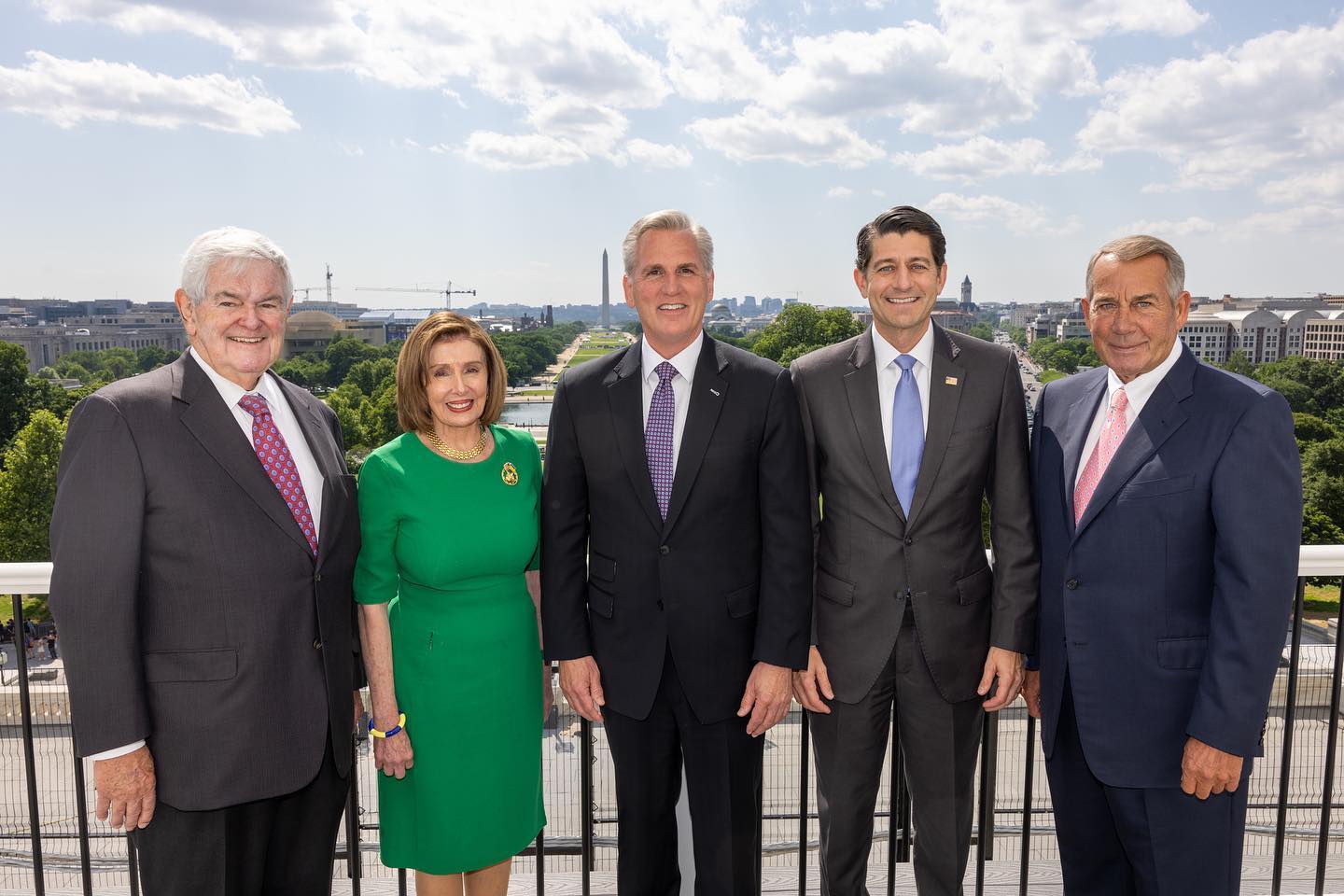
In January 2022, Gingrich told Fox News presenter Maria Bartiromo that members of the House Select Committee investigating the January 6 attack on the Capitol faced a "real risk of jail" after Republicans took over Congress, accusing them of breaking laws without specifying which laws were broken. This statement was widely interpreted by CNN and other outlets as a threat.
In July 2022, he was featured at an America First Policy Institute conference promoting a "Trump-inspired platform for the 2024 GOP presidential nominee." As of August 2022, Gingrich was advising Kevin McCarthy and House Republicans for the 2022 midterm elections, according to journalist Dana Milbank.
7. Political positions and ideology
Newt Gingrich's political beliefs and policy stances have evolved over time, but he is primarily identified with conservative ideology and has significantly influenced the direction of the Republican Party.
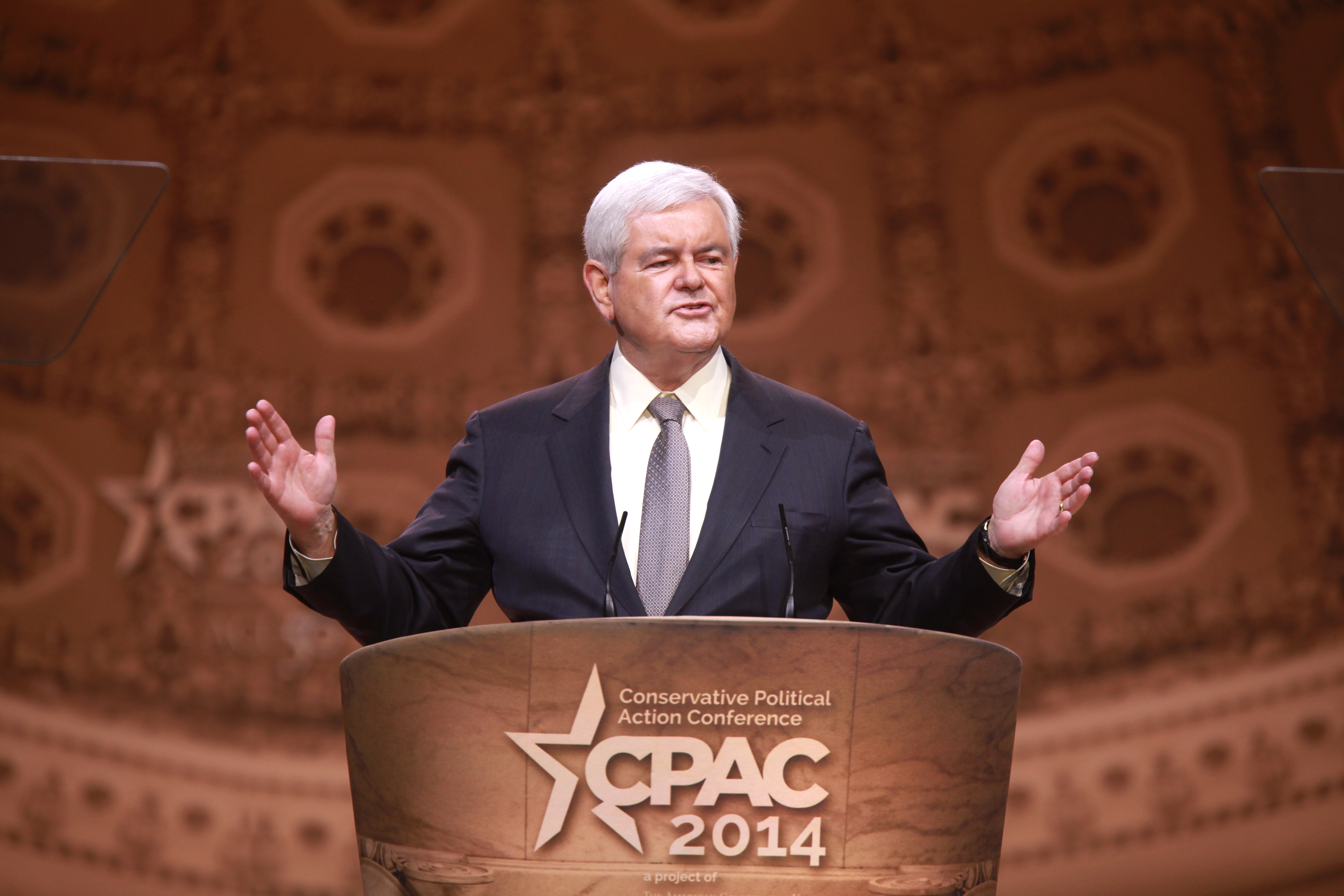

Gingrich is most widely identified with the 1994 Contract with America. He is a founder of American Solutions for Winning the Future.
7.1. Domestic policy
More recently, Gingrich has advocated for replacing the Environmental Protection Agency with a proposed "Environmental Solutions Agency." He favors an immigration border policy combined with a guest worker program. In terms of energy policy, he has argued in favor of flex-fuel mandates for cars sold in the U.S. and generally promoted the use of ethanol. In August 2021, Gingrich was said to have echoed the Great Replacement theory during a Fox News interview.
Gingrich has identified education as "the number one factor in our future prosperity" and has partnered with Al Sharpton and Education Secretary Arne Duncan on education issues. In 2014, Gingrich sent a letter to Dr. John Koza of National Popular Vote, Inc. endorsing the National Popular Vote Interstate Compact, under which participating states would award their Electoral College votes to the winner of the national popular vote of the United States.
7.2. Foreign policy and national security
Gingrich has taken a dim view of internationalism and the United Nations. He stated in 2015, "after several years of looking at the UN, I can report to you that it is sufficiently corrupt and sufficiently inefficient that no reasonable person would put faith in it."
On July 14, 2016, Gingrich controversially stated that he believes Americans of Muslim backgrounds who believe in Sharia law should be deported, and that visiting websites that promote the Islamic State of Iraq and the Levant or Al-Qaeda should be a felony. Some observers have questioned whether these views violate the free speech and free exercise of religion clauses of the First Amendment to the United States Constitution. On July 21, 2016, Gingrich argued that members of NATO "ought to worry" about a U.S. commitment to their defense. He expanded, saying, "They ought to worry about commitment under any circumstances. Every president has been saying that the NATO countries do not pay their fair share." He also stated that, in the context of whether the United States would provide aid to Estonia (a NATO member) in the event of a Russian invasion, he "would think about it a great deal."
7.3. Social issues
Although he previously opposed gay marriage, in December 2012, Gingrich suggested that Republicans should reconsider their opposition to it.
7.4. Views on democracy and polarization
According to Science magazine, Gingrich's view on climate change shifted "from cautious skeptic in the late 1980s to believer in the late 2000s to skeptic again during the [2016] campaign." In January 2022, Gingrich characterized the House Select Committee on the January 6 Attack as "basically a lynch mob" that was violating laws and trampling on civil liberties, suggesting committee members might be jailed if Republicans took control of the House in that year's election.
8. Personal life
Newt Gingrich's personal life has been a subject of public interest, particularly his three marriages, religious conversion, and various personal interests.
8.1. Marriages and children
Newt Gingrich has been married three times.
8.1.1. Jacqueline May "Jackie" Battley
In 1962, at the age of 19, Gingrich married Jacqueline May "Jackie" Battley (February 21, 1936 - August 7, 2013), who was 26 years old and his former high school geometry teacher. They had two daughters: Kathy, who is president of Gingrich Communications, and Jackie Sue, an author, conservative columnist, and political commentator.
Throughout his congressional campaign in 1974, Gingrich was reportedly having an affair with a young volunteer. An aide who worked with Gingrich during the 1970s stated that "it was common knowledge that Newt was involved with other women during his marriage to Jackie." In the spring of 1980, he filed for divorce from Jackie after beginning an affair with Marianne Ginther. Jackie later stated in 1984 that the divorce was a "complete surprise" to her.
In September 1980, according to friends who knew them both, Newt visited Jackie in the hospital the day after she had undergone surgery to treat her uterine cancer; once there, Newt reportedly began discussing the terms of their divorce, at which point Jackie asked him to leave the room. Gingrich disputed this account. Although Newt's presidential campaign staff continued to insist in 2011 that Jackie had requested the divorce, court documents from Carroll County, Georgia, indicated that she had, in fact, asked a judge to block the process, stating that although "she has adequate and ample grounds for divorce... she does not desire one at this time [and] does not admit that this marriage is irretrievably broken."
According to L. H. Carter, Gingrich's campaign treasurer, Gingrich allegedly said of Jackie: "She's not young enough or pretty enough to be the wife of the President. And besides, she has cancer." Newt has denied saying this. Following the divorce, Jackie had to raise money from friends in her congregation to help her and the children financially; she later filed a petition in court stating that Newt had failed to properly provide for his family. Newt submitted a financial statement to the judge, which showed that he had been "providing only 400 USD a month, plus 40 USD in allowances for his daughters. He claimed not to be able to afford any more. But in citing his own expenses, he listed 400 USD just for 'Food / dry cleaning, etc.'-for one person." In 1981, a judge ordered him to provide considerably more; in 1993, Jackie stated in court that Newt had failed to obey the 1981 order "from the day it was issued." Jackie, a deacon and volunteer in the First Baptist Church of Carrollton, Georgia, died in 2013 in Atlanta at the age of 77.
8.1.2. Marianne Ginther
In 1981, six months after his divorce from Jackie was finalized, Gingrich married Marianne Ginther (born 1958). Marianne helped control their finances to get them out of debt. However, she did not desire the public life of a politician's wife. His daughter Kathy described the marriage as "difficult." This marriage produced no children.
8.1.3. Callista Bisek
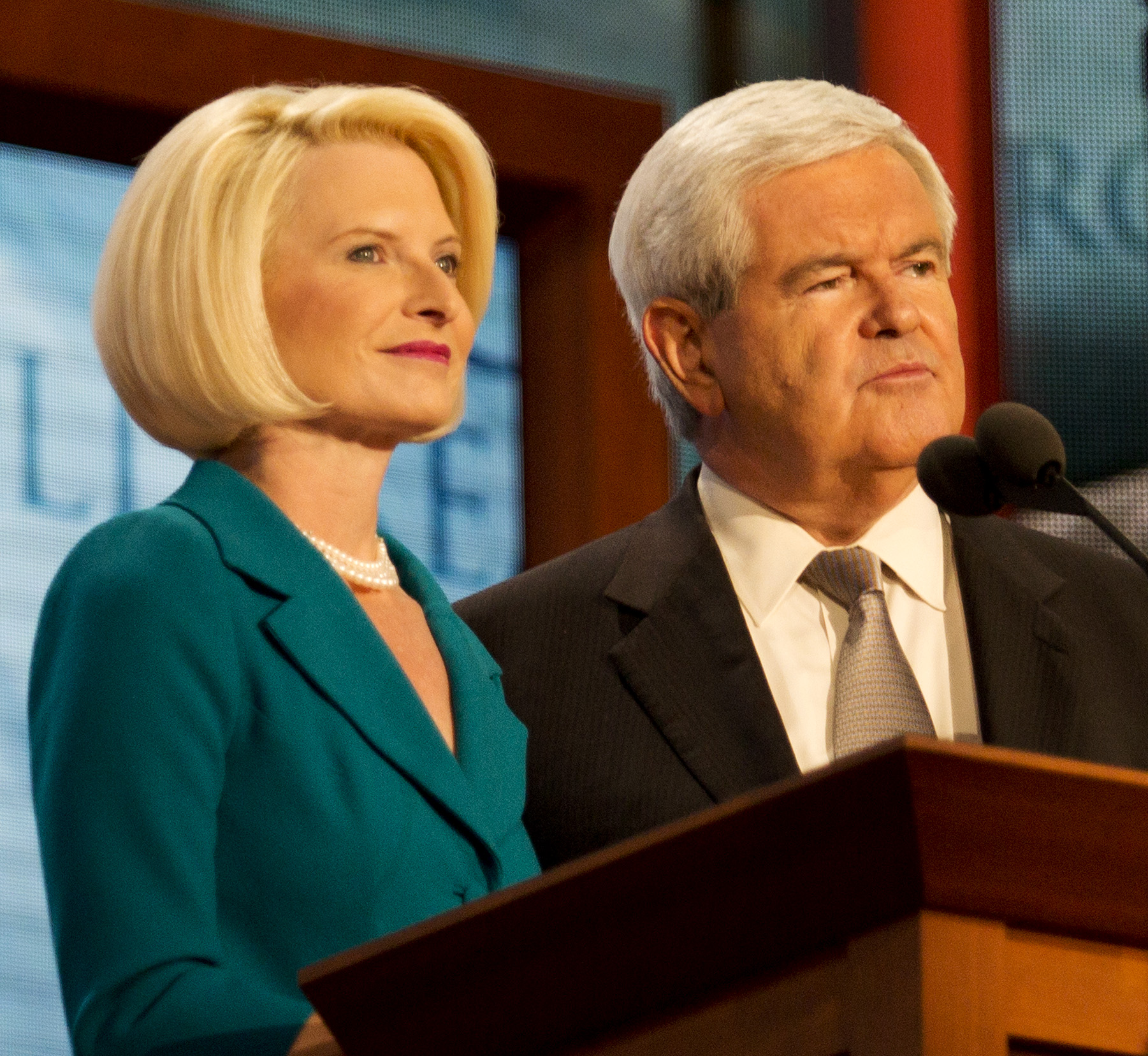
In 1993, while still married to Marianne, Gingrich began an affair with House of Representatives staffer Callista Bisek (born 1966), who was more than two decades his junior. Gingrich was engaged in this affair even as he led the impeachment of Bill Clinton for perjury related to Clinton's own extramarital affair. Gingrich filed for divorce from Marianne in 1999, a few months after she had been diagnosed with multiple sclerosis. On January 19, 2012, Marianne alleged in an interview on ABC's Nightline that she had declined to accept Newt's suggestion of an open marriage. Newt disputed this account.
In August 2000, Gingrich married Callista Bisek, four months after his divorce from Marianne was finalized. He and Callista reside in McLean, Virginia.
In a 2011 interview with David Brody of the Christian Broadcasting Network, Gingrich addressed his past infidelities by stating, "There's no question at times in my life, partially driven by how passionately I felt about this country, that I worked too hard and things happened in my life that were not appropriate." In December 2011, after the group Iowans for Christian Leaders in Government requested that he sign their so-called "Marriage Vow," Gingrich sent a lengthy written response that included his pledge to "uphold personal fidelity to my spouse." The Catholic Church recognizes his third marriage as a valid marriage, based on a declaration of nullity granted for his second marriage and the passing of his first wife.
8.2. Religion
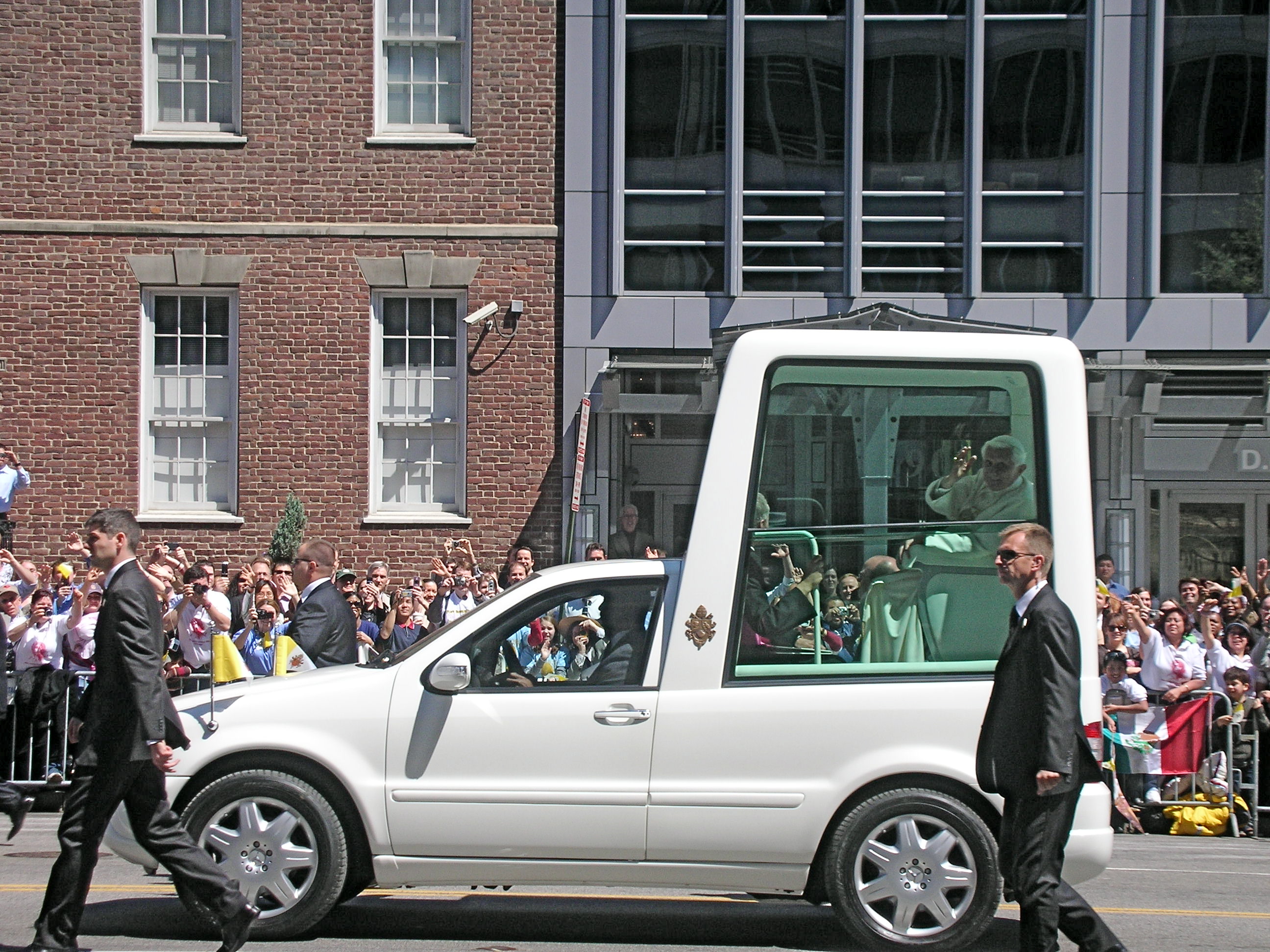
Raised as a Lutheran, Gingrich became a Southern Baptist during his graduate school years. He converted to Catholicism, the faith of his third wife Callista Bisek, on March 29, 2009. He explained his conversion, stating that "over the course of several years, I gradually became Catholic and then decided one day to accept the faith I had already come to embrace." He decided to officially become a Catholic after witnessing Pope Benedict XVI, during the Pope's visit to the United States in 2008. Gingrich described this experience: "Catching a glimpse of Pope Benedict that day, I was struck by the happiness and peacefulness he exuded. The joyful and radiating presence of the Holy Father was a moment of confirmation about the many things I had been thinking and experiencing for several years." At a 2011 appearance in Columbus, Ohio, he stated, "In America, religious belief is being challenged by a cultural elite trying to create a secularized America, in which God is driven out of public life."
8.3. Other interests

Gingrich has expressed a deep interest in animals. His first engagement in civic affairs was speaking to the city council in his native Harrisburg, Pennsylvania, advocating for the establishment of a city zoo. He authored the introduction to America's Best Zoos and claims to have visited more than 100 zoos.
Gingrich has also shown enthusiasm for dinosaurs. The New Yorker noted in 1995 regarding his book To Renew America: "Charmingly, he has retained his enthusiasm for the extinct giants into middle age. In addition to including breakthroughs in dinosaur research on his list of futuristic wonders, he specified 'people interested in dinosaurs' as a prime example of those who might benefit from his education proposals."
Space exploration has been another interest of Gingrich since a fascination with the United States/Soviet Union Space Race began in his teenage years. Gingrich desires the U.S. to pursue new achievements in space, including sustaining civilizations beyond Earth, but advocates relying more on the private sector and less on the publicly funded NASA to drive progress. Since 2010, he has served on the National Space Society Board of Governors.
During the 2012 election campaign, Artinfo noted that Gingrich has expressed appreciation for the work of two American painters. He described James H. Cromartie's painting of the U.S. Capitol as "an exceptional and truly beautiful work of art." In Norman Rockwell's work, he saw the embodiment of an America circa 1965, which he viewed as at odds with the prevailing sentiment of the modern-day "cultural elites."
9. Writings and media
Newt Gingrich has an extensive body of written work, including numerous nonfiction and fiction books, and has been involved in film productions. He is a prolific author, having written 10 books and co-authored 15, covering topics from personal leadership and politics to American Civil War history.
9.1. Nonfiction books
- The Government's Role in Solving Societal Problems, 1982
- Window of Opportunity, 1985
- Contract with America (co-editor), 1994
- Restoring the Dream, 1995
- Quotations from Speaker Newt, 1995
- To Renew America, 1996
- Lessons Learned The Hard Way, 1998
- Presidential Determination Regarding Certification of the Thirty-Two Major Illicit Narcotics Producing and Transit Countries, 1999
- Saving Lives and Saving Money, 2003
- Winning the Future, 2005
- Rediscovering God in America: Reflections on the Role of Faith in Our Nation's History and Future, 2006
- The Art of Transformation, with Nancy Desmond, 2006
- A Contract with the Earth, with Terry L. Maple, 2007
- Real Change: From the World That Fails to the World That Works, 2008
- Drill Here, Drill Now, Pay Less: A Handbook for Slashing Gas Prices and Solving Our Energy Crisis, with Vince Haley, 2008
- 5 Principles for a Successful Life: From Our Family to Yours, with Jackie Gingrich Cushman, 2009
- To Save America: Stopping Obama's Secular-Socialist Machine, with Joe DeSantis, 2010. In this book, Gingrich discusses the "secular socialist machine," a social mechanism he argues President Obama and left-leaning liberals of the Democratic party are pushing to advance their agenda of big government and a socialist state. He argues against this perceived threat, explaining issues comprehensively.
- Ronald Reagan: Rendezvous with Destiny, 2011
- A Nation Like No Other: Why American Exceptionalism Matters, 2011
- Breakout: Pioneers of the Future, Prison Guards of the Past, and the Epic Battle That Will Decide America's Fate, 2013
- Understanding Trump, 2017
- Trump's America: The Truth about Our Nation's Great Comeback, 2018
- Trump vs China: America's Greatest Challenge, 2019
- Trump and the American Future: Solving the Great Problems of Our Time, 2020
- Beyond Biden: Rebuilding the America We Love, 2021
- Defeating Big Government Socialism, 2022
- March to the Majority: The Real Story of the Republican Revolution, 2023
9.2. Fiction books
Gingrich co-wrote several historical fiction novels and series, often exploring alternate history scenarios. His fiction works are noted for their intricate detail and accuracy, even in minor elements.
- 1945, with William R. Forstchen, 1995
- Civil War series** (co-authored with William R. Forstchen)
- Gettysburg: A Novel of the Civil War, 2003
- Grant Comes East, 2004
- Never Call Retreat: Lee and Grant: The Final Victory, 2005
- The Battle of the Crater: A Novel, 2011
- Pacific War series** (co-authored with William R. Forstchen)
- Pearl Harbor: A Novel of December 8, 2007
- Days of Infamy, 2008
- Revolutionary War series** (co-authored with William R. Forstchen)
- To Try Men's Souls: A Novel of George Washington and the Fight for American Freedom, 2009
- Valley Forge: George Washington and the Crucible of Victory, 2010
- Victory at Yorktown, 2012
- Brooke Grant series** (co-authored with Pete Earley)
- Duplicity: A Novel, 2015
- Treason: A Novel, 2016
- Vengeance: A Novel, 2017
- Mayberry and Garrett series** (co-authored with Pete Earley)
- Collusion: A Novel, 2019
- Shakedown: A Novel, 2020
- Civil War series** (co-authored with William R. Forstchen)
9.3. Films
Gingrich Productions, which is headed by Gingrich's wife Callista Gingrich, has produced several documentary films.
- Ronald Reagan: Rendezvous with Destiny, 2009
- Nine Days That Changed the World, 2010
10. Assessment and legacy
Newt Gingrich's political career and leadership have elicited a wide range of assessments, from commendation for his strategic vision to sharp criticism for his confrontational tactics and their impact on American political discourse.
10.1. Positive assessments
Yale University congressional scholar David Mayhew describes Gingrich as profoundly influential, stating, "In Gingrich, we have as good a case as we are likely to see of a member of Congress operating in the public sphere with consequence." Supporters often credit him with revitalizing the Republican Party, leading it to a historic majority in the House after decades in the minority, and pushing through significant legislative reforms such as welfare reform and tax cuts. His strategic leadership and ability to articulate a clear conservative agenda, exemplified by the "Contract with America," are frequently highlighted as major achievements that reshaped American politics.
10.2. Criticisms and controversies
Despite his legislative successes, Gingrich's career is frequently cited for its controversial aspects and his role in escalating partisan animosity. Scholars and critics widely attribute to him a significant role in undermining democratic norms and accelerating political polarization in the United States. He is criticized for introducing and normalizing a "combative" approach within the Republican Party, characterized by the use of harsh, often dehumanizing language against political opponents. He frequently questioned the patriotism of Democrats, labeled them as corrupt, compared them to fascists, and accused them of seeking to destroy the United States.
His leadership was directly linked to the federal government shutdowns of 1995-1996, which were widely seen as a political miscalculation that damaged the Republican Party's public image. His personal grievances, such as the perceived snub by President Clinton on Air Force One, were criticized for influencing the budget standoff, leading to his public lampooning as a "crybaby."
Gingrich also faced significant ethics challenges. He was formally reprimanded by the House of Representatives in 1997 and ordered to reimburse 300.00 K USD for investigation costs related to his use of tax-exempt organizations for political purposes. The House Ethics Committee concluded that inaccurate information was submitted on his behalf with "intentional or... reckless" disregard for House rules, making him the first Speaker to be disciplined for an ethics violation. His personal life also drew scrutiny, particularly the circumstances of his divorces, including allegations of discussing divorce terms with his first wife while she was in the hospital recovering from cancer surgery and claims of suggesting an "open marriage" to his second wife. His affair with Callista Bisek, which began while he was still married and during the impeachment proceedings against President Clinton for his own affair, further fueled criticism regarding his personal conduct and perceived hypocrisy.
His resignation from the speakership in 1999, following a disappointing midterm election performance for Republicans and internal party rebellion, underscored the challenges he faced in maintaining leadership despite his initial successes. In his post-speakership career, his continued promotion of conspiracy theories, such as the Seth Rich murder conspiracy, and his support for Donald Trump's false claims of a stolen 2020 election, including calls for the arrest of poll workers, have drawn further criticism for undermining democratic institutions and norms. His controversial statements regarding the deportation of Muslims who believe in Sharia law and his questioning of U.S. commitment to NATO allies have also been widely condemned. The New York Times in 1998 described him as "an expert in how to seize power, but a novice in holding it," concluding that he illustrated "how hard it is for a radical, polarizing figure to last in leadership."
11. See also
- List of federal political scandals in the United States
- List of federal political sex scandals in the United States
- List of United States representatives expelled, censured, or reprimanded